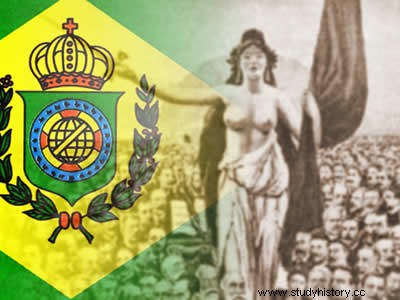
By Rainer Sousa
From the 1870s onwards, Imperial Brazil began to suffer different types of opposition to its regime and the defense of the installation of a Republic in its place. At first, we can think that this situation demonstrated the crisis of the system that consolidated the independence and unity of the Brazilian territory and the clear influence that the country had on European political experiences interested in decreeing the extinction of the Ancien Régime.
Although coherent, we must point out that this reading consolidates a very limited view of the political and intellectual figures who participated in this moment of transition. The republican question in Brazil takes on very particular tones considering that the defenders of this new regime did not promote a replica of the discussions and ideals in the Old World, but also conferred a specific relationship on how the Republic would address the problems of that time.
Strongly concerned with the issue of the country's development and modernization, Brazilian republicans believed that the monarchy operated as the mainstay of slavery. For them, the use of slave labor placed the country in an inferior social, economic and moral position in relation to other industrialized nations that abandoned this type of work relationship. In such a way, the empire was fought for nourishing its own national backwardness.
Thus, we see that the republicanism developed in Empire Brazil seemed to establish a dichotomous vision between the problems of the time and the respective solution for them. In other words, while the imperial government represented the origin and maintenance of various ills and delays, the Republic was the most modern and appropriate solution for new times to be lived. However, it cannot be said that the republicans thought of the new regime in the same way.
Clearly, we see that a portion of Republicans were influenced by the positivism current in the 19th century. Strengthened in values of a rational nature, the republican government would naturally be more apt in relation to the traditions and excesses that permeate the monarchy. In addition to the positivists, we should also point out that some texts influenced by utopian socialism embraced the republican cause and its democratic precepts as a way of meeting popular aspirations.
Thus, taking such characteristics, we see that republicanism not only undertakes the function of an instrument of attack on the imperial regime. By being taken by different trends, the republic assumes the ability to offer a response to different sectors of the intelligentsia of that time. In addition to attacking the Crown and slavery, the defense of a new political model reveals the nuances of the political and intellectual scene at the end of the 19th century.
Related video lesson:
